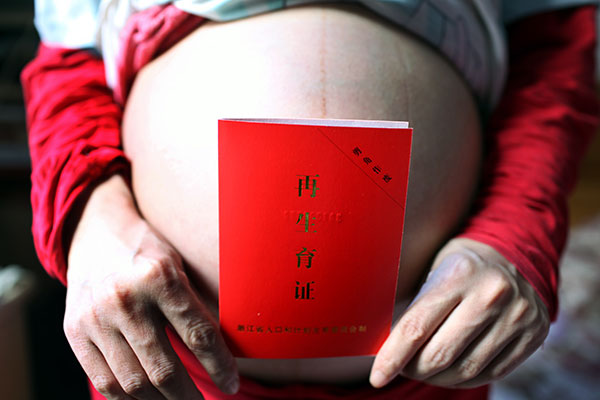
A birth approval certificate for a second child is shown by a pregnant woman in Quzhou, Zhejiang province, in April last year.(XU YUANCHANG/CHINA DAILY)
Tradition of large families has changed in big cities with economy and govt policy, expert says
Most couples don't want to expand their families, if the low number applying for a second child in Beijing under today's rules is an indicator of parental thinking.
Even if a couple is eligible, under the current policy, for a second offspring because one parent is an only child, only about 10 percent seek more children, according to data released on Friday by the Beijing Municipal Commission of Health and Family Planning.
By the end of October, 55,851 qualified couples applied to health authorities in Beijing to have a second child since the city adopted the policy in February last year, the commission said.
That is roughly one-tenth of the estimated 550,000 couples who are eligible under that standard, set in 2013.
Previously, a second child in most urban areas of China was restricted to parents who were both only children.
The central government further relaxed the policy last month, allowing all couples in China to have two children. The change must still be approved by the National People's Congress, the top legislature, before it becomes law.
By the end of May, 1.45 million couples with one parent being an only child had applied to have a second baby, accounting for about 13 percent of all eligible couples, according to the National Health and Family Planning Commission.
The number of eligible couples applying to have a second child in the country has increased between 80,000 and 90,000 every month, the commission said.
Yuan Xin, an expert in population studies at Nankai University in Tianjin, said that with the development of the Chinese economy and society over the past several decades, the traditional concept of having more children has changed and more people are opting for fewer children, especially in big cities such as Beijing.
"It has been a mainstream concept among Beijing residents to give birth to fewer children after decades of the family planning policies the city adopted in the 1970s", and allowing all couples to have two children will improve the population structure of Beijing and maintain the vitality of society, the Beijing commission said
The city will amend its population laws and improve family planning services, such as building more maternal care and nursery institutes and kindergartens, to cope with an increase in births, it said.


















































